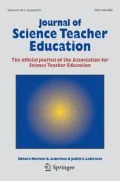References
Alvermann, D. E., & Swafford, J. (1989). Do content area strategies have a research base?Journal of Reading, 32, 388–394.
Armbruster, B., Anderson, T., & Ostertag, J. (1989) Teaching text structure to improve reading and writing.Reading Teacher, 43, 130–137.
Anderson, C. W. (1987). Strategic teaching in science. In B. F. Jones, A. S. Palincsar, D. S. Ogle, & E. G. Carr (Eds.),Strategic Teaching and Learning: Cognitive Instruction in the Content Areas. Alexandria, VA: Association for Supervision and Curriculum Development.
Anderson, R. C., Spiro, R. J., & Anderson, M. D. (1978). Schemata as scaffolding for the representation of information on connected discourse.American Educational Research Journal, 15, 433–440.
Bransford, J. D. (1979).Human Learning, Understanding and Remembering. Belmont, CA: Wadsworth.
Brown, A. L. (1982). Learning how to learn from reading. In J. A. Langer & M. T. Smith-Burke (Eds.),Reader Meets Author/Bridging the Gap. Newark, DE: International Reading Association.
Champagne, A. B. (1985, April). Structured peer interactions and physical science learning. Paper presented at the Annual Meeting of the American Education Research Association, San Francisco.
Denning, D., & Yore, L. D. (1987). Science reading in B. C. secondary schools.B.C. Catalyst, 31 (2), 15–18.
Farrell, R. T., & Cirrincione, J. M. (1984). State certificates in reading for content area teachers.Journal of Reading, 28, 152–157.
Flood, J. (1986). The text, the student, and the teacher: Learning from exposition in middle school.Reading Teacher, 39, 784–791.
Holliday, W. G. (1988, April). Studying science information using metacognitive knowledge and experiences. A paper presented at National Association for Research in Science Teaching Annual Meeting, Lake Ozark, MO.
Jacobs, J. E., & Paris, S. G. (1987). Children’s metacognition about reading: Issues in definition, measurement, and instruction.Educational Psychologist, 22, 255–278.
Jacobowitz, T. (1988) Using theory to modify practice: An illustration with SQ3R.Journal of Reading, 32, 126–131.
Lipson, M. Y. (1984). Some unexpected issues in prior knowledge and comprehension.Reading Teacher, 37, 760–764.
Maria, K., & MacGinitie, W. (1987) Learning from texts that refute the reader’s prior knowledge.Reading Research and Instruction, 26, 222–238.
Novak, J. D., & Gowin, D. B. (1984).Learning how to learn. New York: Cambridge University Press.
Osborne, R. J., & Freyberg, P. (1985).Learning in science: The implications of children’s science. London: Heinemann.
Osborne, R. J., & Wittrock, M. C. (1983). Learning science: A generative process.Science Education, 67, 489–508.
Palincsar, A. S., & Brown, A. L. (1984). Reciprocal teaching of comprehension-fostering and comprehension-monitoring activities. In L. B. Resnick, J. H. Larkin, & R. C. Anderson (Eds.),Cognition and instruction. Hillsdale, NJ: Lawrence Erlbaum.
Paris, S. G. (1987).Reading and thinking strategies. Lexington, MA: D.C. Heath.
Pearson, P. D., & Dole, J. A. (1987). Explicit comprehension instruction: A review of research and a new conceptualization of instruction.Elementary School Journal, 88, 151–166.
Pearson, P. D., & Spiro, R. (1982, May). The new buzz word in reading is schema.Instructor, 46–48.
Pressley, M., Johnson, C. J., Symons, S., McGoldrick, J. A., & Kurita, J. A. (1989) Strategies that improve childrens’ memory and comprehension of text.Elementary School Journal, 90, 3–22.
Robinson, F. P. (1941).Effective Study. New York: Harper.
Rumelhart, D. E. (1976).Toward an Interactive Model of Reading (Tech. Rep. No. 56). San Diego: University of California, Center for Human Information Processing.
Samuels, S. J. (1983). A cognitive approach to factors influencing reading comprehension.Journal of Educational Research, 76, 261–266.
Shymansky, J. A., Yore, L. D., & Good, R. (1991). Elementary teachers’ beliefs and perceptions of elementary school science, science reading, science textbooks, and supportive instructional factors.Journal of Research in Science Teaching, 28, 437–454.
Spiro, R. J. (1980). Constructive processes in prose comprehension and recall. In R. J. Spiro, B. C. Bruce, & W. F. Brewer (Eds.).Theoretical Issues in Reading Comprehension. Hillsdale, NJ: Lawrence Erlbaum.
Steward, O., & Tei, E. (1983). Some implications of metacognition for reading instruction.Journal of Reading, 27, 36–43.
Weinstein, C. E., & Mayer, R. E. (1986). The teaching of learning strategies. In M. C. Witrock (Ed.),Handbook of Research in Science Teaching (3rd Ed.). New York: Macmillan.
Wertsch, J. V. (1979). From social interaction to higher psychological processes: A clarification and application of Vygotsky’s theory.Human Development, 21, 1–22.
Wittrock, M. C. (1981). Reading comprehension. In F. J. Pirozzolo & M. C. Wittrock (Eds.),Neuropsychological and cognitive processes of reading. New York: Academic Press.
Wittrock, M. C., Marks, C., & Doctorow, M. (1975). Reading as a generative process.Journal of Educational Psychology, 67, 484–489.
Yore, L. D. (1984).Content area reading activities: Science. Toronto: Doubleday Canada.
Yore, L. D. (1987). A preliminary exploration of grade five students’ achievement and ability to read science textbooks as a function of gender, reading vocabulary, and reading comprehension. (ERIC Document Reproduction Service No. ED 282 728)
Yore, L. D. (1991). Secondary Science teachers’ attitudes towards and beliefs about science reading and science textbooks.Journal of Research in Science Teaching, 28, 55–72.
Yore, L. D., & Denning, D. (1989). Implementing change in secondary science reading and textbook usage: A desired image, a current profile and a plan for change. (ERIC Document Reproduction Service No. ED 305 270)
Yore, L. D., & Shymansky, J. A. (1985). Reading, understanding, remembering and using information in written science materials. (ERIC Document Reproduction Service No. ED 258 825)
Author information
Authors and Affiliations
About this article
Cite this article
Yore, L.D., Shymansky, J.A. Reading in science: Developing an operational conception to guide instruction. J Sci Teacher Educ 2, 29–36 (1991). https://doi.org/10.1007/BF02962849
Issue Date:
DOI: https://doi.org/10.1007/BF02962849

